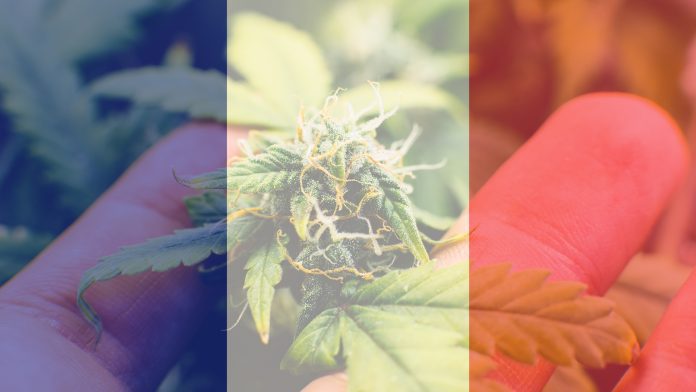
Following the launch of a medical cannabis trial to examine how the drug could be prescribed and dispensed legally, Lorna Rothery spoke to Benjamin-Alexandre Jeanroy about the development of France’s regulatory framework for cannabis, and the factors hindering this.
The legalisation of medical cannabis remains heavily fragmented and changeable across EU Member States. While progress is slowly being made in facilitating access to cannabis for long-term conditions, it is neither straightforward for patients, nor an easy market for producers to navigate. In a bid to overcome the complex regulatory quagmires surrounding the cannabis market and examine the possibilities for the prescription of medical cannabis, countries including Denmark, Ireland and France are running medical cannabis trials.
Despite being one of Europe’s biggest consumers of cannabis, the drug is illegal in France. Only derivatives of the cannabis plant are permitted in the manufacturing of medicinal products and supplied on prescription when all other treatments have failed. In March 2021, the country’s National Agency for the Safety of Medicines and Health Products (ANSM) launched a nationwide scheme which would enable up to 3,000 patients to access cannabis-based treatment for free on prescription for five specific conditions. Due to end in March this year, the trial was recently extended to March 2024, but recent clinical data from the trial has so far been positive. To discuss the political and regulatory challenges surrounding the legalisation of medical cannabis in France, and whether the harmonisation of the industry across Europe is likely in the near future, Lorna Rothery spoke to Benjamin-Alexandre Jeanroy, the Co-Founder and CEO of Augur Associates, the first consultancy firm dedicated to a sustainable cannabis and hemp industry in France.
What is the current legal and medical status of cannabis in France?
A medical cannabis trial was launched with the aim of integrating a process in France to enable the prescription and distribution of medical cannabis products. It approves the use of cannabis for five conditions: refractory neuropathic pain, epilepsy, multiple sclerosis (MS), cancer-related symptoms and palliative care. This ‘experiment’ was recently extended for another year, due to political, technical and budgetary reasons, and is now due to finish in March 2024.
The French health ministry is finalising a decree that will mark the beginning of the cannabis industry in France, particularly concerning production transformation and distribution. A lot of companies are already well established in France and engaged in one avenue of the industry, including in R&D and importation for research. However, some stakeholders have given up because of the length of time it is taking to establish any kind of industry in the country; many have spent a lot of money with nothing in return, or no timeline for when they can expect financial returns.
On the patient side, there is a lot of frustration. Many people are unable to benefit from the nationwide trial and access free cannabis products on prescription. There is a strange dichotomy between the lack of patients reached to take part in the trial and the many who would benefit from cannabis-based treatments but are essentially still treated like criminals for trying to source cannabis products elsewhere.
The list of conditions which could benefit from cannabis-based treatments is being reviewed by authorities, but I imagine it will only be authorised for long-term illnesses initially. Governing bodies are unsure about the growth stages of the plant, its sub-products, and how patients will be reimbursed for medications. In France, patients with long-term illnesses who meet the coverage requirements outlined by the French health insurance system are usually fully reimbursed. The five conditions currently listed could equate to treatments for between seven hundred thousand and two million patients.
Like in many other countries where cannabis is being incorporated into pre-existing frameworks, there exist many barriers to patient access. For instance, many patients are denied a medical cannabis prescription until the later stages of their illness, when other treatments have failed to work. Many small, but impactful regulatory challenges like this are currently hindering the development of a medical cannabis regulatory framework.
There is a sense of political inertia in moving the cannabis agenda forward, are any politicians openly supporting the legalisation of cannabis in France?
In his former role as Minister of Solidarity and Health Olivier Véran was the leading politician on the issue of medical cannabis. Being a doctor himself, he was more aware of patients’ conditions and plight and was crucial in making medical cannabis part of the pharmaceutical and public health discussions in France.
The industry is still fighting against conservatism and people who do not believe cannabis has therapeutic properties. While Véran had an important place in the government, the COVID-19 pandemic overshadowed efforts to affect change and push forward the medical cannabis agenda. Since then, we find there are few, if any, politicians in France who are fighting for the legalisation of medical cannabis publicly; politicians, while willing to discuss the matter, are not leading the charge on this issue.

How about patient groups and their impact?
Patients are arguably the best proponents because they know and can raise awareness of the therapeutic benefits of these products. We advocate for the private sector and patient groups to find common ground because they could be very good allies for each other. There are, however, few patient groups in France; on the one side you have those centred around compassionate social clubs that do not want any publicity, and then others that are more focused on cannabis-based scientific research and disseminating that research rather than raising awareness through media outlets, for instance. We are lacking a lot of patient support from the industry; it is very hard to translate the importance of the patient perspective into concrete financial backing. We have seen positive initiatives with compassionate pricing in Canada and private companies really have no better advocates than the patients they can help.
How would the legalisation of cannabis for medicinal use aid progress in French healthcare and what economic benefits could it have?
At present, there is very little research on this, not just in France but anywhere. Trying to financially compute what this would mean in practice, and indeed which products would sell more or less, and the impact of those market fluctuations is hard to analyse. However, having the capacity to show what it could mean is a very interesting argument and would of course depend on the public health model of the country in question. It is something that would need to be explored in the future, but probably in a more scientific way, and supported financially by private companies because that approach, supported by solid scientific data, is the best way to convince the administration.
There have been some interesting studies that show about 50% of people, if not more, who consume cannabis ‘recreationally’, do so for medical reasons. When we take that into account, inadequate patient access has an impact on the sustainability of the illicit market. Right now, there are a lot of people who, consciously or not, consume cannabis from the illicit market for self-medication, with all the danger that it poses, while we have bottleneck access to legal, medical cannabis.
Do you see medical cannabis gaining wider legal acceptance throughout the EU in the future? Would a more standardised regulatory approach help patients and practitioners?
I do think without a doubt that the industry and the use of medical cannabis is going to be more widely authorised and available, albeit at different rates across Europe. I do not think that we are close to having a harmonised system, nor that it is necessarily favourable, even for patients. What you need in that regard is freedom of transport and travel. Another should be the European right for them to grow their own medicine, for instance, or join compassionate social clubs. These latter activities will continue to happen regardless, so it makes sense to regulate them for the sake of the patients.
There is movement from the European Parliament, and the battle is being unfolded on many different dimensions – from the strict pharma approach to the more holistic medicine approach. The European pharmaceutical industry is a force to be reckoned with and has access to capital that many medical cannabis companies do not, and that translates into very different means of interest at EU level. From novel foods to funding, the varying arguments continue to unfold and will determine how and when the medical cannabis industry is standardised across Europe.
Benjamin-Alexandre Jeanroy
Co-founder and CEO
Augur Associates
https://en.augur.associates/
https://www.linkedin.com/in/benjaminalexandrejeanroy/?originalSubdomain=fr
This article is from issue 25 of Health Europa Quarterly. Click here to get your free subscription today.









